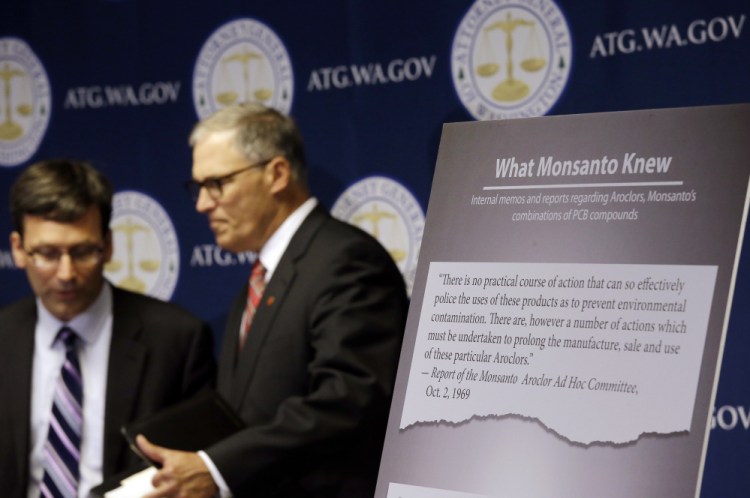SEATTLE — Washington has become the first U.S. state to sue the agrochemical giant Monsanto over pervasive pollution from PCBs, the toxic industrial chemicals that have accumulated in plants, fish and people around the globe for decades. The company said the case “lacks merit.”
Democratic Gov. Jay Inslee and Attorney General Bob Ferguson announced the lawsuit at a news conference in downtown Seattle on Thursday, saying they expect to win hundreds of millions or even billions of dollars.
“It is time to hold the sole U.S. manufacturer of PCBs accountable for the significant harm they have caused to our state,” Ferguson said, noting that the chemicals continue to imperil the health of protected salmon and orcas despite the tens of millions of dollars Washington has spent to clean up the pollution. “Monsanto produced PCBs for decades while hiding what they knew about the toxic chemicals’ harm to human health and the environment.”
The suit arrives just days before Monsanto shareholders vote whether to accept a $57 billion buyout offer from Germany’s Bayer. The extraordinary meeting of shareholders takes place just outside of St. Louis on Tuesday.
PCBs, or polychlorinated biphenyls, were used in many industrial and commercial applications, including in paint, coolants, sealants and hydraulic fluids. Monsanto, based in St. Louis, produced them from 1935 until Congress banned them in 1979.
According to the U.S. Environmental Protection Agency, PCBs have been shown to cause a variety of health problems, including cancer in animals as well as effects on the immune, nervous and reproductive systems.
In a company release, Monsanto spokesman Scott S. Partridge said that the “case is experimental because it seeks to target a product manufacturer for selling a lawful and useful chemical four to eight decades ago that was applied by the U.S. government, Washington state, local cities, and industries into many products to make them safer. … Most of the prior cases filed by the same contingency fee lawyers have been dismissed, and Monsanto believes this case similarly lacks merit.”
Several other cities – including Seattle, Portland, Oregon, and Oakland, Berkeley, San Jose, Long Beach and San Diego, California – have also sued Monsanto over PCB pollution. Those cases are ongoing.
Ferguson, a Democrat, pointed to internal Monsanto documents that show the company long knew about the danger the chemicals posed. In 1937, an internal memo said testing on animals showed “systemic toxic effects” from prolonged exposure by inhaling PCB fumes or ingestion.
Nevertheless, Monsanto told officials around the country the contrary. In a letter to New Jersey’s Department of Conservation that year, Monsanto wrote, “Based on available data, manufacturing and use experience, we do not believe PCBs to be seriously toxic.”
Washington’s suit seeks damages on several grounds, including product liability for what it described as Monsanto’s failure to warn about the danger of PCBs; negligence; and even trespass, for injuring the state’s natural resources.
Send questions/comments to the editors.



Success. Please wait for the page to reload. If the page does not reload within 5 seconds, please refresh the page.
Enter your email and password to access comments.
Hi, to comment on stories you must . This profile is in addition to your subscription and website login.
Already have a commenting profile? .
Invalid username/password.
Please check your email to confirm and complete your registration.
Only subscribers are eligible to post comments. Please subscribe or login first for digital access. Here’s why.
Use the form below to reset your password. When you've submitted your account email, we will send an email with a reset code.